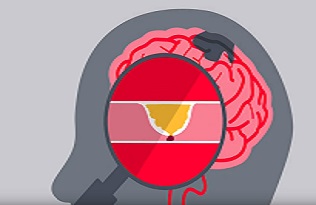
Stroke - causes, signs and symptoms
Discover the causes and symptoms of a stroke, which occurs when the blood supply to part of your brain is cut off, causing brain damage.

Damage to brain blood vessels in some patients with dementia was seen and described in post-mortem examinations many years ago. But the extent to which brain blood vessel damage contributes to dementia, either alone or in combination with Alzheimer's disease, only began to become apparent more recently with advances in brain MRI.
Vascular dementia is now known to be the second most common type of dementia, affecting around 150,000 people in the UK. It’s caused by reduced blood flow to an area of the brain, which damages and eventually kills brain cells in the affected area. The reduced blood flow can be caused by a stroke or mini-stroke (transient ischaemic attack) or by narrowing and blockage of the smallest blood vessels in the brain. Despite how common it is, people with vascular dementia have limited treatment options and there isn’t much evidence to say which treatments are best.
The BHF is working with other funders including Alzheimer's Society and the Stroke Association to understand more about the disease and to find new ways to treat or prevent it.
People who have had a stroke, even a minor one, are at increased risk of vascular dementia. This is particularly true for a lacunar stroke, which is caused by damage to one of the small blood vessels deep within the brain.
There is currently no treatment for lacunar stroke. To help change this, the BHF is funding Professor Joanna Wardlaw, at the University of Edinburgh, to lead the LACI-2 trial. This early trial will test whether two drugs, cilostazol and isosorbide mononitrate, which are already used to treat other heart and circulatory diseases, could help reduce the damage to the small blood vessels in the brain after a lacunar stroke.
If successful, this research could lead to a larger trial of cilostazol and isosorbide mononitrate to treat lacunar strokes and potentially prevent some cases of dementia.
There are very few clinical trials for people with vascular dementia. This is partly because we know so little about the disease that it is unclear what new drugs or treatments would be most useful to test.
Also, despite the close link between stroke and vascular dementia, they have traditionally been studied as separate processes. This separation may have delayed advances in our knowledge about the link between the two conditions. To try to solve this problem, in 2017 the BHF, Stroke Association and Alzheimer’s Society came together to fund research into vascular dementia. Together we funded a collaboration of experts in stroke and vascular dementia, led by Professor Wardlaw, to answer fundamental questions about the two conditions: who will develop memory and thinking problems after stroke, why does this happen, and how can we treat it?
The study is following 2,000 people who have had a stroke from around the UK, using memory tests and thinking tests to measure who develops problems in the two years following the stroke. The researchers are looking at lifestyle factors and genes, to try to find out what factors may cause vascular dementia, and how we can predict and prevent it.
They will also use blood tests and brain scans to find out how to spot vascular dementia early and make it easier to diagnose.
The detailed knowledge gathered from this research should make it possible for researchers to design clinical trials that target specific groups of patients, which will potentially speed up the development of diagnostic tests and treatments for vascular dementia.
Every cell in the body produces waste products from their normal function, including brain cells. The BHF, Stroke Association and the Alzheimer’s Society are also funding Professor Roxana Carare at the University of Southampton to explore whether the brain’s methods of removing waste substances are linked to vascular dementia. Tiny pathways in the walls of the small blood vessels in the brain are used to carry away toxic waste products. Dr Carare is studying how this system is disrupted in dementia and may lead to further damage. By investigating the mechanisms in mice she hopes to find novel treatments for vascular dementia. This research could lead to drugs for vascular dementia that work by draining waste fluid from the brain.
First published 1st June 2021